A cautious halt halfway brings good fortune,
Going through to the end brings misfortune.
--I Ching
An excerpt from the Amazon book, "Riding the Dragon's Back, the Great Race to Run the Wild Yangtze," by Richard Bangs with Christian Kallen. At this point an American expedition is making its way to the source, but deadly waters boil ahead.
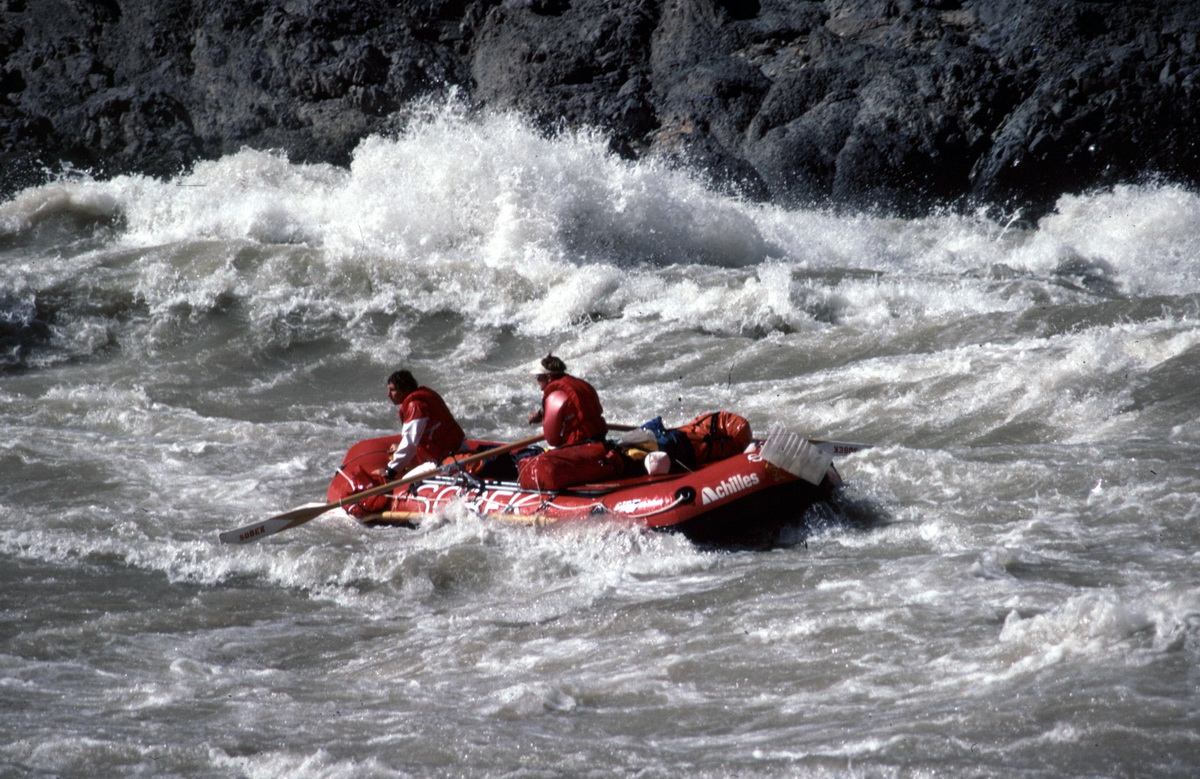
During the two weeks the expedition traveled from Hong Kong to the headwaters of the Yangtze, most of the difficulties that would later plague the team had already surfaced. There was the matter of equipment--the sheer weight and bulk of the gear Warren had brought along necessitated elaborate means of transportation, leading to unnecessary expenditures of effort and eventually making the job of portaging large rapids a monumental task. The altitude had frayed nerves and shattered the already fragile health of some team members, most particularly David Shippee. Not even Ken Warren was immune to its effects, given the fact that at 59 he was nearly 15 years older than the next oldest team member. He suffered from a wracking cough, perhaps the result of a possible asthma condition or the lingering effects of the lung worm he had picked up years before. He also had only his left kidney, having lost the other in surgery ten years earlier, and he had high blood pressure and a slight hemorrhoid condition.
Still, there they were, at their first goal, the source of the Great River. One team member was missing, though: photographer David Shippee, who was recuperating in Golmud. When, on the trek in, Dr. Gray had diagnosed pneumonia and altitude sickness, and recommended David be driven down to a government rest house at Golmud, Ken Warren had called the doctor "alarmist"--he didn't believe David was that ill, and he wanted David to photograph the headwaters of the Yangtze and the float back down to Tuotuoheyan. But David had known he was sick all right, and took the truck down to Golmud to rest.
After three days in Golmud, in a cell-like room that smelled of urine, David received a letter written by Jan Warren, and cosigned by herself, her husband and Dan Dominy, as the film crew's representative--saying he had two choices: "Based on how you are feeling you can return to base camp and await our arrival or head straight for home. You are not free t;o rome [sic] around China, and we be greatly upset to heard about it [sic]. Already this [your illness] has been an added expense."
The note shook David. He turned to his diary: "I don't plan to 'ROME' anywhere in the near future, except possibly back up to base camp." Nonetheless, by the time David received the note he was feeling better. He had little Chinese money left, having used up most of his $100 carrying cash on two phone calls to his wife, Margit. But there was enough to pay his hotel bill and buy a ticket on a public bus back to base camp. He was determined to return and finish the expedition, to prove he wasn't a pansy.
Before hopping the bus, he wrote one last letter to Margit: "We have 2,000 miles of muddy water, mosquitoes, poisonous snakes, waterfalls, and dehydrated food ahead of us." He arrived back at the Tuotuoheyan base camp on July 19, and waited for the source team to arrive. Shippee continued to record his thoughts: "July 23: Margit's and my wedding anniversary is tomorrow, and we are 10,000 miles apart. This base camp life is crazy as it is, without my sweetheart always on my mind. God, how I miss Margit and that easy Boise life. The physical aspect of being on top of the world becomes less challenging every day, but the mental strain of life on this dust bowl is something else. I maintain a level head by reminding myself that we are not stuck here forever." Shippee had taken the last of his antibiotics, but the lung ailment that had troubled him seemed to be returning. "I am sure it is the cold/flu that everyone else got while I had pneumonia. I was healthy for 11/2 years before this trip, and now, boom."
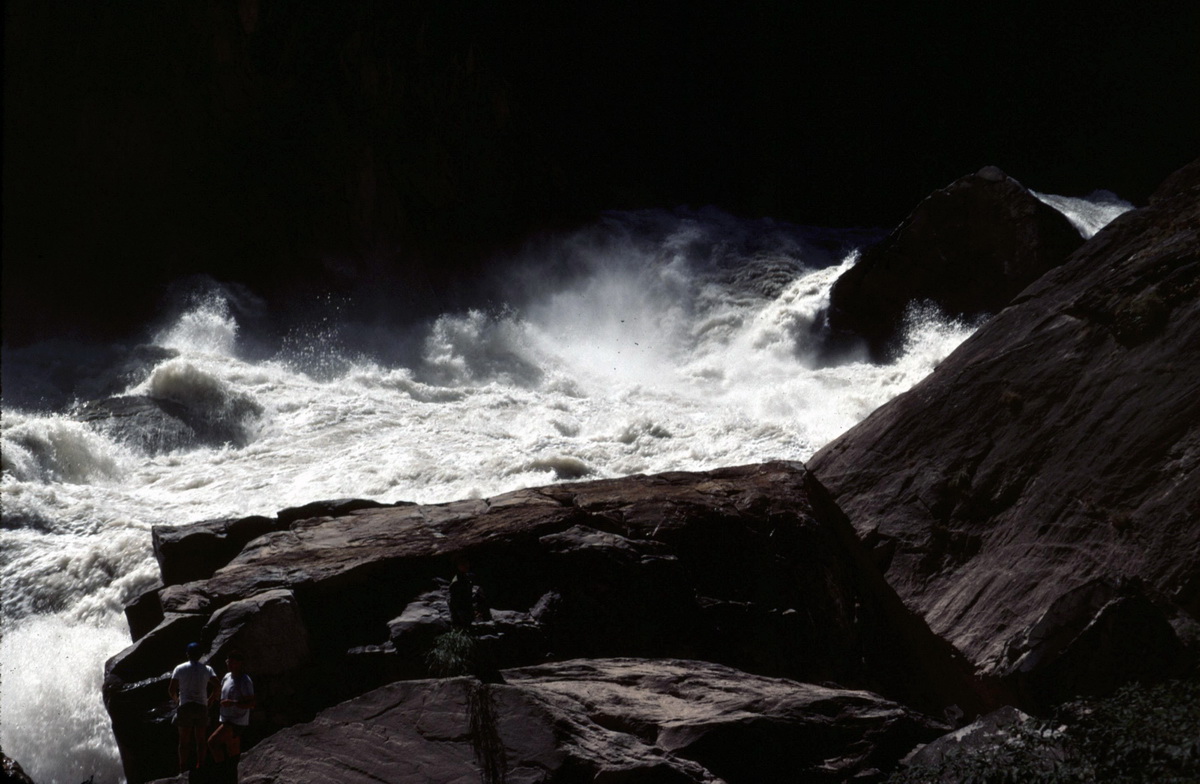
Warren had scribbled a note back at Qemo to be taken to the base camp, instructing that additional food be packed and brought upstream to the kayaks if they didn't arrive by a certain date. The camp had received the note, and David set about packing a resupply run, thinking Warren just wanted some extra supplies to supplement an already ample main stock. For the first time, but not the last, Warren under-estimated the time it would take to run a leg of the river, so on July 27 the pony pack team sent from base camp met them on the river with the resupply he had requested. It was woefully inadequate, overstocked with toilet paper, paper towels, and more pots and pans. The only food was a package of pancake flour, some honey, and Tang. Warren seethed, his mood already grouchy from the recurrence of what he called his "Preparation H affliction." But the resupply team assured him they had only one more long day on the river before they reached base camp, so the next morning after a breakfast feast of pancakes, honey, and Tang, they set off.
Late on the last kayak float day, Monday, July 28, the expedition paddled into a cheering camp under an afternoon sky as bright as their smiles. To nearly everyone's surprise, a healthy David Shippee, renewed by his recovery in Golmud, rolled up his pants and bounded into the knee-deep channel to help pull the boats ashore.
Ken Warren got out of his boat and was rewarded with cold Chinese beer. With cameras whirring, Ken and Jan spoke to their prospective audience: "Most difficult thing I've ever done in my life," Ken asserted.
When the cameras were turned off Ken's mood reverted, and he raised his voice as he leaned over David Shippee's slim frame: "Who put together that goddamn resupply? We starved up there. I wonder whose fault that was?"
David accepted the blame, but again turned to his diary to vent his feelings: "Everybody lost at least 15 pounds apiece. Ken and Jan were pleased they lost weight. They weighed themselves in front of everybody as if to announce that losing weight was a benefit rather than a fuck-up. The resupply was not part of the plan because there was no plan."
The next morning Ken Warren, wary as ever of group meetings, held face-to-face meetings with each expedition member, handing them written evaluations of their performance thus far on the trip. He had complaints about the attitude and performance of several, including Dr. David Gray, and David Shippee.
Warren had nothing but complaints about the doctor's contribution to the workload, was disappointed in the emergency medical kit he supplied, and questioned his judgment about David Shippee's health.
David Shippee wrote his wife, Margit, back in Idaho that Warren had given him a mediocre evaluation. The expedition leader was not pleased that the young photographer had become ill and missed documenting the first leg of the trip.
After two days at base camp, it was time to start the next leg of the expedition. A crew of fifteen was picked to ride in seven boats, including David Shippee, who had convinced Warren he was fully recovered and able and eager to join the downriver expedition: he wouldn't miss it for the world.
It would be 540 river miles until the next resupply point at Yushu, for which Warren allocated eight to ten days--an average of about 60 miles a day, a highly optimistic goal. Meanwhile Jan Warren and the road crew would have to drive 1,350 miles over bad roads to reach the same place--back through Golmud to Xining, the capital of Qinghai Province far to the northeast, across the upper Yellow River, and then back down to the southwest to reach Yushu.
On Thursday, July 31 -- right on schedule -- Chinese soldiers and local Tibetans dressed in traditional costumes staged a sendoff ceremony for the Warren group. They presented each expedition member with a red triangular scarf sent by schoolchildren in a Boy Scout-like organization from Tianjin, China's third largest city, to the southeast of Beijing. The Tuotuoheyans also gave out katak, pieces of silk commonly used by Tibetans as greeting gifts, then toasted the adventurers with kerosene-tasting barley wine. Speeches were made and a poem read about the cooperation between the Chinese and American expeditioneers about to embark. Shortly after noon, amidst an aural hailstorm of firecrackers, drums, and cheers, the next leg was launched.
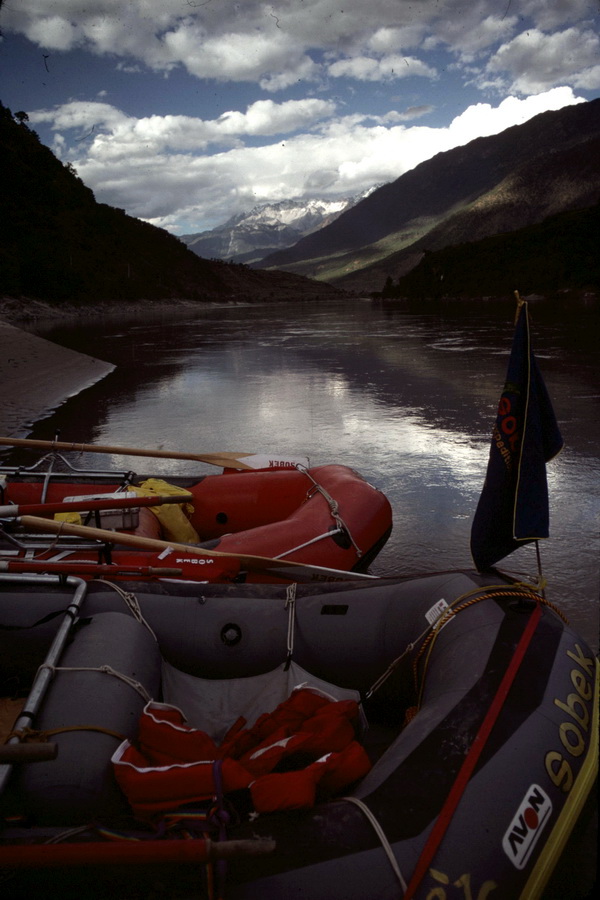
The river had risen a bit with the recent rains, but was still shallow, and the lumbering rafts had to pick through the braids, fight the upriver winds, and be wrestled over gravel bars.
In the lead boat was Ken Warren at the oars, with David Shippee and Dan Dominy in the bow focusing their cameras on the leader. As he had been doing since returning up to Tuotuoheyan, Shippee threw himself into his work, quick to leap from the raft when it became grounded to help heave it back into deep water. "The channels are braided like a rope," he wrote. "We had to drag the 18-foot, heavily loaded boats across about 50 yards of sand bar . . . the task was a killer."
That first night they camped on an island. The temperature dropped below 20° F., and it snowed heavily. On the second day Ken Warren mistakenly led the group down several wrong channels that turned into sandbars and required the crews to get out and push and pull. Behind the leader's back, curses were flung whenever this happened. "A shallow river is not hard to read, but an old man of the sea is tough to order around," Shippee wrote. Because of the hang-ups, they made only twenty miles that day, and it was clear they were falling far behind the schedule Warren had set.
Still, there were rewards: the scenery remained wildly impressive, and they were treated to a special wildlife sighting, as Shippee's diary recounts: "Three wild asses watched us float by from a hilltop. They were beautiful, graceful-looking animals. They looked like a cross between a wild horse, a deer and an antelope. They had white, short legs with dark splotchy bodies and long manes and tails. The asses looked as if they were laughing at us as we struggled through the shallow water below them."
There was a pain in David's chest as he wrote these words. He didn't know it, but they would be the last he would ever write.
The morning of the third day, August 2, the Tuotuohe was joined by the larger Dam Qu River from the south, and the combined stream started to take on some size, making floating easier. From the confluence of the Dam Qu until Yushu, their next goal, the river is called the Tongtian Ho, meaning literally "River Going Through the Heavens," or more simply "River to Heaven." The day began intermittently sunny, though an ominous black patch hung on the northern horizon and seemed to be rolling their way. That afternoon, about 3:30 P.M., the black patch swept towards their flotilla with frightening speed, and brought with it a blizzard.
Within seconds, nobody could see more than fifty feet in any direction. Snow collected on the rafts and life jackets, and the temperature plummeted. Finally the blizzard lifted. The sky cleared as quickly as it had eclipsed, and the temperature soared to 70° F. But the blizzard had stung David Shippee, who now sank into relapse. That morning he had moved to another boat and occasionally had taken a photograph, but his movements had been forced and slow. Following the blizzard he was clearly distressed, and an early camp was called.
That night the doctor listened to David's lungs and heard the telltale wet noises that indicated excess fluid--a sign of the beginning stages of pulmonary edema, a very serious form of high altitude sickness that can quickly lead to a victim's drowning in his own internal body fluids. The only known cure is immediate evacuation to a lower altitude. On the vast, two-mile-plus-high Tibetan plateau where they were camped, the only fast way to a lesser elevation was by helicopter.
The doctor alerted Ken Warren to the seriousness of the situation and urged action. It was about 8:30 in the evening, but the summer sun had not yet grazed the horizon. Warren had the 1,500-watt portable generator fired up, attached the expedition Icom radio for the first time on the trip, and tried to make contact with his road crew. But someone had forgotten to bring the coaxial antenna, and at first the radio only spat static. About a hundred feet of conductive wire was hurriedly rigged between two oars as an antenna, and at last human voices faintly crackled.
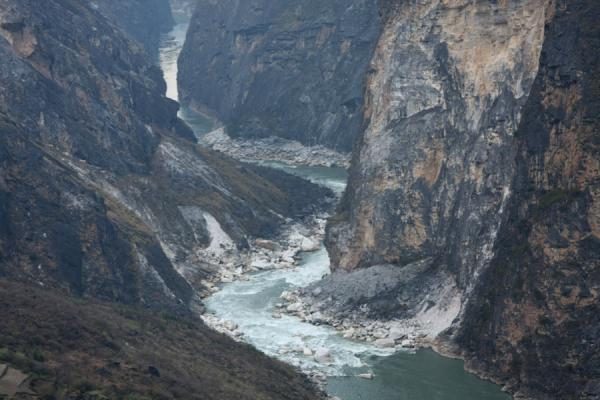
But the tinny voices coming over the radio sounded Russian, and there was no possibility of communication. Although some said that there were assigned frequencies and times for radio contact established before the expedition set out from Tuotuoheyan, Warren himself claimed there had been no plan for radio communication in this quiet-water section. In addition, there had been no base camp testing of the equipment prior to their launch, and this lack of a radio check made any contact a shot in the dark. As it happened, the radio in Jan's truck, also missing its antenna, was packed away, unavailable to receive broadcasts. She and the land support truck were perhaps three hundred miles to the northeast, and had no idea they were being called.
Later, Gary Peebles recalled in an interview with the Idaho Statesman that Warren "was in his sleeping bag very casually turning the knob to see if he could hear any English." Peebles added that Warren "declined to explain to him why he didn't have one of the Chinese attempt to call for help in Chinese," the Statesman reported. Peebles also asserted that Chu Siming had told him Warren had been instructed in advance how to make emergency radio contact with the Chinese air force. Warren, for his own part, said that he checked on Shippee himself, bringing the bedridden photographer a cup of hot tea in his tent and covering him with his own survival suit. Shippee, still anxious about pleasing the expedition leader, apologized repeatedly for being so much trouble, but Warren told him not to worry, just to get well.
Sometime that night, Dr. Gray went back to Shippee's candlelit tent and asked how the patient was doing.
"I feel strange; I feel weird," David told the doctor.
"Do you feel you're going to die?"
"Yeah, I do."
The next morning Shippee was weak, barely conscious, cyanotic, and congested. The expedition had to move on: the only way to lower elevations was the river, though it was to be an agonizingly slow descent. Dr. Gray laid Shippee out in his sleeping bag along the front thwart of one raft, a tarp slung above him for shade from the burning sun. The doctor rigged up an intravenous line, both to administer antibiotics and to provide saline solution to prevent dehydration. Shippee became delirious; he babbled that he was in Minnesota, at his old pool hall hangout with his buddies. By midday a raft had sprung a small leak, so the group pulled in for an early camp not long afterwards. They had traveled only about one hundred miles downstream from Tuotuoheyan in four days, far short of their schedule. David was so weak he had to be carried off the boat. Dr. Gray tried to give him an oxygen' mask, but Shippee could barely breathe. By nightfall he had slipped into a coma.
That night David Shippee lay in his tent semi-comatose. The radio was tried once again, but no voices spoke through the static to the desolate crew. In desperation, Warren and other crew members tried to fly a kite with the jury-rigged antenna attached. It was lifted about seventy-five feet into the steely skies.
"Breaker, breaker, Mayday, Mayday. This is the Yangtze River expedition, can anybody hear me?" Ken called into the microphone. There was no contact. The doctor took Warren aside and disclosed the worst prognosis.
At 11:24 P.M., August 3, 1986, the spirited redhead died. A tearful Toby Sprinkle broke the news to Ken Warren, who was in his tent, pitched away from the others on a knoll. "My best friend just died, Dave is dead," he sobbed.
Although Warren must have been upset, Sprinkle remembers only a callous Warren brushing him off with "What are you crying for, Toby? People die on expeditions. You could be next."
About one hundred yards from the rushing waters of the River to Heaven, Gary Peebles cried as he stabbed the earth with a shovel, digging a grave four feet deep in the hard permafrost soil. It had dawned clear, and birds were singing as the sun rose and they put David's body into a yellow waterproof bag and lowered it into the ground. There had been talk of taking the body out with them, but questions about morale and sanitation led them to agree on a wilderness burial.
The team members took turns filling the grave. A single black and yellow oar with David's name and the date of his death, carved in English on one side, in Chinese on the other, was planted on the grave. Bill Atwood started to remove the large American flag from his boat to attach to the oar, but Warren vetoed the move, saying they needed the flag for the film. So instead China's red celestial flag was hung from the blade, and below it five tiny American flags, representing David's five days on the river -- including that final morning. Rocks were piled high on the grave, like a traditional Tibetan cairn; wildflowers were placed beside it. Three shots were fired from the expedition carbine as a final tribute.
After fourteen days they arrived late in the afternoon of August thirteenth at the Zhimenda Bridge, about sixteen miles from the inland town of Yushu. Here they were greeted by the road crew, whose smiles of congratulation turned to tears on the news of David Shippee's death. Jan broke down in her husband's arms. Then she told Ken her own news: several Chinese rafters had disappeared somewhere downriver, between Yushu and Batang, and were presumed drowned.
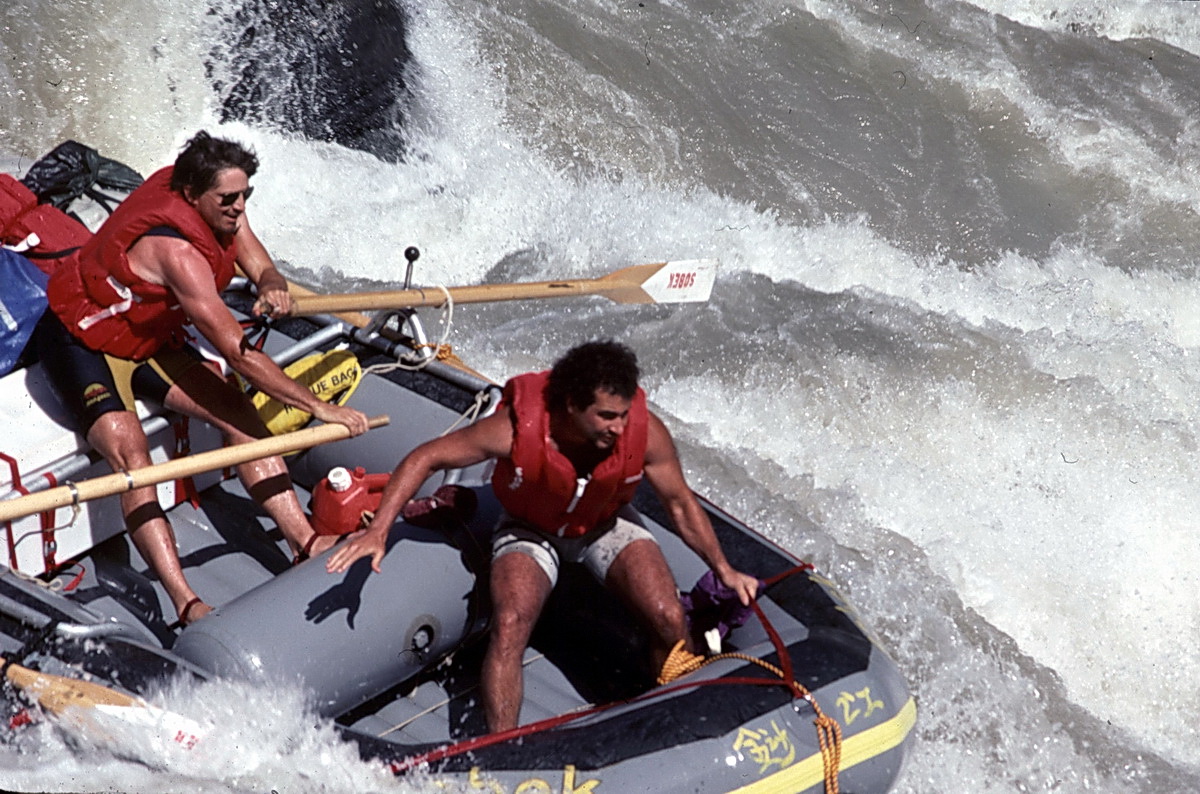
From "Riding the Dragon's Back," by Richard Bangs with Christian Kallen.